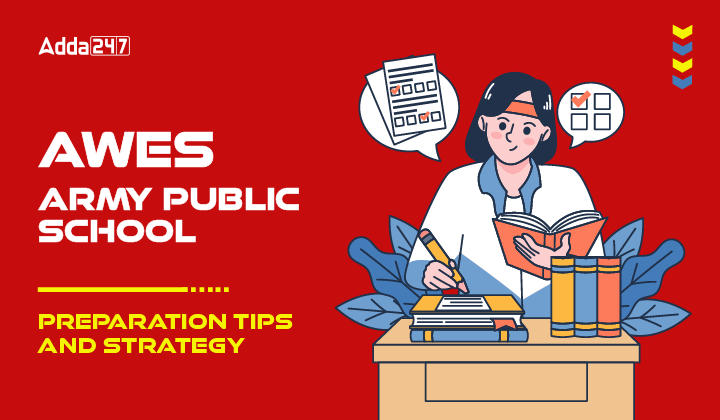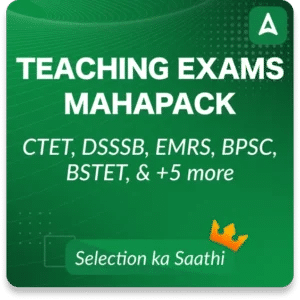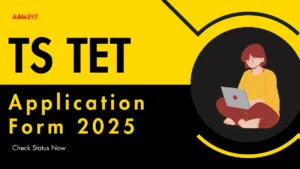Table of Contents
Teaching aspirants should prepare quickly as they have the chance to secure a rewarding position in the Army Public School. The Army Welfare Education Society (AWES) exam is set for 23 and 24 November 2024. In this article, candidates will find valuable tips and strategies to effectively tackle the AWES Army Public School Exam 2024.
Army Preparation Tips and Strategy
The Army Welfare Education Society (AWES) Army Public School exam is scheduled for 23 and 24 November 2024. With the exam approaching, candidates should begin their preparation with clear goals and a well-defined strategy. This article provides the most effective subject-wise preparation tips for the Army Public School exam.
Check AWES Exam Pattern
Candidates preparing for the Army Public School entrance exam should review the AWES exam pattern and marks distribution before starting their preparation. This will give them a clear understanding of the exam structure and help them develop an effective strategy to cover the entire Army Public School syllabus within the given time frame, ensuring success. Take a moment to carefully go over the key aspects of the exam pattern below:
- The Army Public School Exam 2024 consists of a total of 200 questions.
- The question paper carries a total of 200 marks.
- Candidates are given a total time duration of 3 hours (180 minutes) to complete the exam.
- The exam format is Objective Type, with Multiple Choice Questions (MCQs).
- As per the marking scheme, 1 mark is awarded for each correct answer.
- There is a negative marking of 1/4 mark for each incorrect answer.
AWES Army Public School Marks Distribution
The following table provides a clear overview of the marks distribution according to the Army Welfare Education Society (AWES) Army Public School syllabus and exam pattern. Candidates are required to answer a total of 200 questions within 3 hours. This marks distribution will assist candidates in determining how much time to allocate to each section based on the assigned marks.
| AWES Army Public School Marks Distribution | |||
| Section | Content | Total Questions | Timing |
| Section A | Basic GK & Current Affairs | 20 | 3 hr |
| Section B | Pedagogy, Curriculum & Education Policy matters | 20 | |
| Section C | Academic Proficiency | 160 | |
Practice AWES Army Public School Previous Year Question Paper
It is essential for the candidates to practice the AWES Army Public School Previous Year Question Paper. Here are some of the benefits of practicing AWES Army Public School previous year question papers for the AWES Army School Exam 2024 mentioned in detail below.
- Familiarizes you with the exam pattern and format: Practicing AWES Army Public School previous year question papers gives you a thorough understanding of the exam structure, including question types, section-wise weightage, and time allocation. This helps you prepare more effectively and manage your time efficiently during the exam.
- Helps identify strengths and weaknesses: By working through previous year question papers, you can pinpoint your strong and weak areas in each subject and topic. This allows you to focus more on areas needing improvement.
- Improves problem-solving skills: Solving these papers enhances your problem-solving abilities and critical thinking, which is crucial as many exam questions require you to apply knowledge to real-world problems.
- Boosts confidence: Consistently practicing and performing well in previous year papers can significantly increase your confidence, helping you approach the exam with a positive mindset.
Subject-Wise Army Public School Preparation tips
In the following section, candidates will find in-depth and comprehensive subject-wise Army Welfare Education Society Army Public School Preparation Tips. These tips will help you formulate an effective plan of action for you to Prepare for your Army Public School exam 2024.
Preparation Tips For Army Public School General Awareness Section
General Awareness is a broad subject that needs to be covered within a limited time. However, it is also one of the highest-scoring sections. Candidates should allocate at least 1 hour daily to study the syllabus provided by the Army Welfare Education Society. Focus areas include topics like history, geography, sports, culture, national and global economic situations, current affairs, general science, and books and authors.
To enhance general knowledge, candidates should develop a habit of reading newspapers daily, gathering as much information as possible, especially from the past year. This will help deepen their understanding of national and international issues.
Preparation Tips For Army Public School Reasoning Section
As the name suggests, candidates need to strengthen their reasoning abilities and sharpen their reasoning skills for this section, which assesses critical thinking. Key topics to focus on include coding-decoding, number series, direction sense, blood relations, decision-making, ranking, time sequence, and more.
Candidates should dedicate at least 1 hour and 30 minutes each day to cover the entire syllabus. Regular practice is essential to enhance problem-solving skills. Ensure a strong grasp of concepts to identify question patterns effectively, as understanding and recognizing these patterns are crucial for success in the Army Welfare Education Society exam.
Preparation Tips For Army Public School English Comprehension Section
This section of the Army Welfare Education Society exam evaluates candidates’ language skills and proficiency. Candidates should dedicate at least 1 hour daily to study, focusing on grammar rules, punctuation, syntax errors, and similar concepts. It’s beneficial to expand vocabulary by learning new synonyms and antonyms, familiarizing oneself with common idioms and phrases, and mastering tenses.
Additionally, candidates will face questions based on an unseen passage. Therefore, regular practice of reading and answering questions from unseen passages is essential to improve comprehension and performance in this part of the exam.
Preparation Tips For Army Public School Educational Concept & Methodology Section
The Educational Concepts and Methodology section is aimed at assessing candidates’ understanding of teaching children. During preparation, candidates should focus on topics related to child growth and development, educational psychology, and effective teaching methods tailored to various situations.
While the questions in this section are generally direct, it’s important to thoroughly study all relevant theories and concepts. To excel in this area, candidates should dedicate at least 1 hour and 30 minutes daily to their preparation.
Preparation Tips For Army Public School Computer Skill Section
This section assesses candidates’ proficiency in computer skills, focusing on their general understanding of basic concepts and computer usage. While this section is relatively easier, it should not be overlooked. Candidates should thoroughly review the syllabus and familiarize themselves with fundamental computer terminology and technology.
Army Public School Preparation Tips
The candidates must go through the following Army Welfare Education Society Army Public School Preparation Tips to ensure they are giving their best during the preparation.
- Set achievable and manageable goals.
- Create a daily study routine and adhere to it consistently.
- Allocate time for daily revision.
- Take daily quizzes, as they are an effective preparation method.
- After covering the entire syllabus, begin taking Army Welfare Education Society Army Public School mock tests.
Army Public School Preparation Strategies
Here are some effective Army Welfare Education Society Army Public School Preparation Strategies and Techniques to deal with the Army Public School Teacher Exam 2024.
- Analyze Performance: After completing mock tests and practice papers, candidates should evaluate their performance to identify strengths and weaknesses, allowing for better strategizing.
- Revision is Key: Regularly review learned material to strengthen understanding and retention. Create concise notes for quick revision of the Army Welfare Education Society syllabus.
- Stay Positive and Motivated: Maintain a positive attitude and confidence in yourself. Engage with supportive peers or study groups to stay motivated.
- Take Breaks: Prevent burnout by incorporating short breaks into study sessions. Physical activity and relaxation can enhance focus and productivity.
- Stay Healthy: Prioritize physical and mental health by eating well, exercising, and ensuring sufficient sleep to remain refreshed and alert.
- Avoid Procrastination: Adhere to the study schedule and avoid delaying tasks. Consistency and dedication are essential for success.
- Seek Guidance: For challenging topics or concepts, seek assistance from teachers, mentors, or online forums.
AWES Strategies Time-Table
The AWES Army Public School timetable for teaching aspirants encompasses all subjects included in the syllabus and offers a balanced daily schedule. Candidates should note that this is a sample timetable and can adjust the timing according to their personal preferences and energy levels. Consistency is crucial, so aim to follow this routine as closely as possible.
| Army Public School Preparation Strategies Time-Table | |
| Time | Subject |
| Morning | General Awareness |
| 6:00 AM – 7:00 AM | Read newspapers and watch news for current affairs. |
| 7:00 AM – 8:00 AM | Study general knowledge and static GK topics. |
| 8:00 AM – 9:00 AM | Solve practice questions and quizzes on general awareness. |
| Late Morning | Reasoning Section |
| 10:00 AM – 11:00 AM | Learn and practice different reasoning topics. |
| 11:00 AM – 12:00 PM | Solve reasoning practice sets and sample papers. |
| Afternoon | English Comprehension & Computer Skills |
| 1:00 PM – 2:00 PM | Work on grammar and vocabulary. |
| 2:00 PM – 3:00 PM | Practice reading comprehension and solve English practice questions. |
| 3:00 PM – 4:00 PM | Focus on computer fundamentals and basic software applications & Practice computer-related questions and tasks. |
| Late Afternoon & Evening | Educational Concept & Methodology |
| 5:00 PM – 6:00 PM | Study educational theories, teaching methods, and pedagogy. |
| 6:00 PM – 7:00 PM | Solve questions related to teaching techniques and classroom management. |
| Night | Subject Concerned |
| 8:00 PM – 10:00 PM | Concentrate on your academic subject (your specialization) and solve practice questions. |




 Last Minute Preparation Tips for MP TET ...
Last Minute Preparation Tips for MP TET ...
 TS TET Application Form 2025 Out, Direct...
TS TET Application Form 2025 Out, Direct...
 Preparation Strategy to Crack DBT BET 20...
Preparation Strategy to Crack DBT BET 20...














